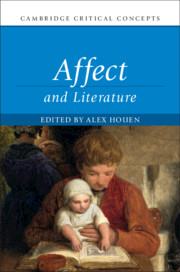Book contents
- Affect and Literature
- Cambridge Critical Concepts
- Affect and Literature
- Copyright page
- Contents
- Notes on Contributors
- Introduction
- I Origins
- II Developments
- Chapter 11 Feeling Feelings in Early Modern England
- Chapter 12 Laughable Poetry
- Chapter 13 Modernism, Formal Innovation, and Affect in some Contemporary Irish Novels
- Chapter 14 The Antihumanist Tone
- Chapter 15 Bette Davis’s Eyes and Minoritarian Survival: Camp, Melodrama, and Spectatorship
- Chapter 16 Affective Form
- Chapter 17 Subaltern Affects
- III Applications
- Index
Chapter 13 - Modernism, Formal Innovation, and Affect in some Contemporary Irish Novels
from II - Developments
Published online by Cambridge University Press: 16 January 2020
- Affect and Literature
- Cambridge Critical Concepts
- Affect and Literature
- Copyright page
- Contents
- Notes on Contributors
- Introduction
- I Origins
- II Developments
- Chapter 11 Feeling Feelings in Early Modern England
- Chapter 12 Laughable Poetry
- Chapter 13 Modernism, Formal Innovation, and Affect in some Contemporary Irish Novels
- Chapter 14 The Antihumanist Tone
- Chapter 15 Bette Davis’s Eyes and Minoritarian Survival: Camp, Melodrama, and Spectatorship
- Chapter 16 Affective Form
- Chapter 17 Subaltern Affects
- III Applications
- Index
Summary
Can formal innovation make a direct contribution to the affective power of prose fiction? Do the kinds of linguistic deformation characteristic of a certain strand of modernism lend themselves to the depiction, and evocation in the reader, of emotion? These questions are raised with particular force by a number of recent Irish novels, which can be seen as taking up the challenge posed by Joyce in Ulysses and Finnegans Wake. Three such novels are the focus of this essay: Eimear McBride’s A Girl is a Half-Formed Thing, Kevin Barry’s Beatlebone, and Mike McCormack’s Solar Bones. Short passages are discussed in order to demonstrate that the innovative linguistic devices in these novels – McBride’s fragmented stream-of-consciousness tracing of the traumatic events in a young woman’s life, Barry’s comic invention of an episode in John Lennon’s career, and McCormack’s unpunctuated, spatially arranged meditation – all enhance rather than reduce their emotional impact.
Keywords
- Type
- Chapter
- Information
- Affect and Literature , pp. 249 - 266Publisher: Cambridge University PressPrint publication year: 2020
- 14
- Cited by

